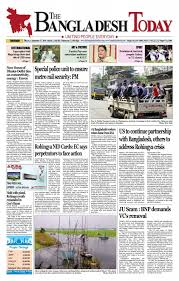
Table of Contents
Mission To Bangladesh
In a groundbreaking move, the United Nations has decided to deploy its first fact-finding mission to Bangladesh since the country gained independence in 1971. This mission marks a significant shift in the UN’s approach to addressing issues within the country, reflecting both the evolving nature of global diplomacy and the urgent need to address complex human rights and humanitarian concerns in the region. This essay explores the historical context, objectives, implications, and potential outcomes of this unprecedented UN initiative.
Historical Context
Bangladesh emerged as an independent nation in 1971 after a tumultuous liberation war against Pakistan. The war, marked by severe atrocities, human rights abuses, and widespread violence, led to the creation of the new state of Bangladesh. Despite the immediate post-war euphoria, the country has faced numerous challenges since its independence, including political instability, economic struggles, and recurrent humanitarian crises.
In the years following independence, Bangladesh has experienced both growth and turmoil. The UN has engaged with Bangladesh on various fronts, including development aid, disaster relief, and human rights advocacy. However, the specific request for a fact-finding mission indicates a new level of international scrutiny and concern, particularly regarding recent developments that have raised alarms on the global stage.
Objectives of the Mission
The primary objective of this UN fact-finding mission is to investigate and document human rights violations and humanitarian issues reported in recent times. Although the specific nature of these issues can vary, recent reports have highlighted concerns related to political repression, minority rights, and abuses linked to government actions and local conflicts.
- Human Rights Violations: The mission aims to thoroughly investigate allegations of human rights abuses, including extrajudicial killings, enforced disappearances, and arbitrary arrests. These concerns have been raised by various human rights organizations and activists, pointing to a troubling pattern of state-sponsored violence and suppression of dissent.
- Humanitarian Crises: Another critical focus is the assessment of humanitarian conditions, particularly in regions affected by natural disasters or conflict. Bangladesh, being prone to cyclones, floods, and other environmental challenges, often faces severe humanitarian crises that require international attention and support.
- Political and Social Stability: The mission will also examine the broader political and social landscape, assessing how current policies and actions impact societal stability and the well-being of ordinary citizens.
Implications of the Mission
The deployment of a UN fact-finding mission carries significant implications for Bangladesh, its government, and the broader international community.
- International Pressure: The mission will place increased international pressure on the Bangladeshi government to address human rights abuses and improve transparency. Governments under scrutiny often face heightened scrutiny from global actors, which can lead to diplomatic and economic consequences if issues are not adequately addressed.
- Domestic Reactions: Within Bangladesh, the mission could provoke a range of reactions. Some may view it as a necessary intervention to ensure accountability and justice, while others might perceive it as an infringement on national sovereignty. The political discourse surrounding the mission could influence public opinion and impact the country’s domestic policies.
- Global Diplomacy: For the UN, conducting this mission represents a reaffirmation of its commitment to human rights and humanitarian principles. It underscores the organization’s role in addressing global issues and holding member states accountable for their actions. The findings and recommendations from the mission will likely shape international responses and strategies regarding Bangladesh.
Potential Outcomes
The outcomes of the UN fact-finding mission could vary widely based on its findings and the response from the Bangladeshi government. However, several potential scenarios can be anticipated.
- Documentation of Findings: One likely outcome is the comprehensive documentation of human rights abuses and humanitarian issues. This documentation will provide a detailed account of the situation on the ground, which can be used to inform international policies and interventions.
- Recommendations for Reform: The mission may propose specific recommendations for reforms to address the identified issues. These recommendations could include changes in government policies, legal reforms, and measures to enhance transparency and accountability.
- International Support and Sanctions: Depending on the severity of the findings, the international community may respond with increased support for humanitarian efforts or, conversely, impose sanctions or other punitive measures against the Bangladeshi government. The mission’s findings will be instrumental in shaping these responses.
- Impact on Domestic Policy: The mission’s results could lead to changes in domestic policy within Bangladesh. If the government is receptive to the recommendations, it may undertake reforms to improve human rights conditions and address humanitarian needs. Conversely, resistance to the findings could exacerbate existing tensions and complicate efforts to resolve the issues at hand.
Conclusion
The UN’s decision to send its first fact-finding mission to Bangladesh since 1971 is a historic and consequential development. It underscores the importance of addressing human rights and humanitarian concerns with diligence and transparency. The mission’s findings and subsequent actions will have far-reaching implications for Bangladesh, the international community, and the broader discourse on global human rights.
As the mission progresses, the world will be watching closely to see how the issues are addressed and whether meaningful changes will emerge from this significant international intervention. Ultimately, this mission represents both a challenge and an opportunity for Bangladesh to address longstanding issues and move toward a more just and stable future.







